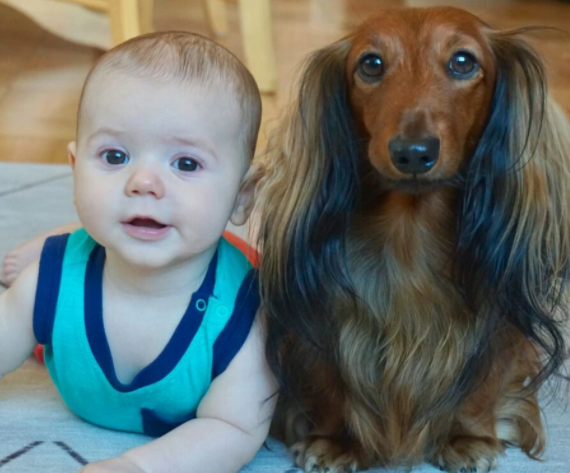When to Start Preparing Your Dog
 The additional time you have before the infant shows up, the almost certain it is your dog will be OK with the progressions that are going to happen in your home.
The additional time you have before the infant shows up, the almost certain it is your dog will be OK with the progressions that are going to happen in your home. It can't be focused on enough that you ought not postpone preparing your dog for the infant's appearance. You won't have the opportunity to deal with these progressions with another child close by, and your dog will be stupefied. Rather, start the change time frame in any event half a month, if not a couple of months, before the child's expected date.
Submission Training
One of the initial steps you should take to set up a dog for another infant is to begin taking a shot at or reviving acquiescence preparing. A respectful dog who realizes fundamental compliance orders is simpler to oversee than one who is wild. Acing essential aptitudes now, for example, sit, down, and strolling on a rope, will make life a lot simpler when you are attempting to think about the necessities of your infant.
Work on Behavior Issues
There are a few dog conduct issues that can be irritating, or even hazardous when you are thinking about an infant. Things, for example, yelping and damaging conduct can be an aggravation, making more work for you or alarming the infant out of rest.
Consider Crate Training
On the off chance that you haven't utilized a container for your dog before, you might need to consider acquainting him with box preparing now. Indeed, even a housebroken dog can profit by being carton prepared.
Slowly Change Routines
In the event that everything changes simultaneously when the child returns home, the dog will connect changes with the infant and may feel angry. Roll out little improvements, similar to the area of its food bowl or its bed, so the dog can adjust ahead of time.
Mingle Your Dog to Babies
Numerous dogs are never around infants until their family brings one home. At the point when you consider everything that joins an infant - new sounds and scents, changes to the day by day normal, sharing consideration - it's anything but difficult to perceive any reason why it very well may be a confounding and terrifying experience for a dog.
Get Your Dog Used to the Smells
Bring home infant things like powder, cleanser, diapers and whatever else you'll be utilizing every day with another infant. Presenting these new scents in front of infant's appearance will make it less overpowering for the dog.
Tighten the Attention
Doubtlessly you'll be investing less energy with your dog after the child's conceived. It might appear to be nonsensical to downsize on the consideration you give your dog in front of the birth; you might need to give him a greater amount of your time now since you know there will be less time later.
Be that as it may, it's better for the dog if the progress happens progressively, so abbreviate play time and strolls before infant's appearance. A sudden move in consideration could make the dog envious, and at any rate, will confound it.


